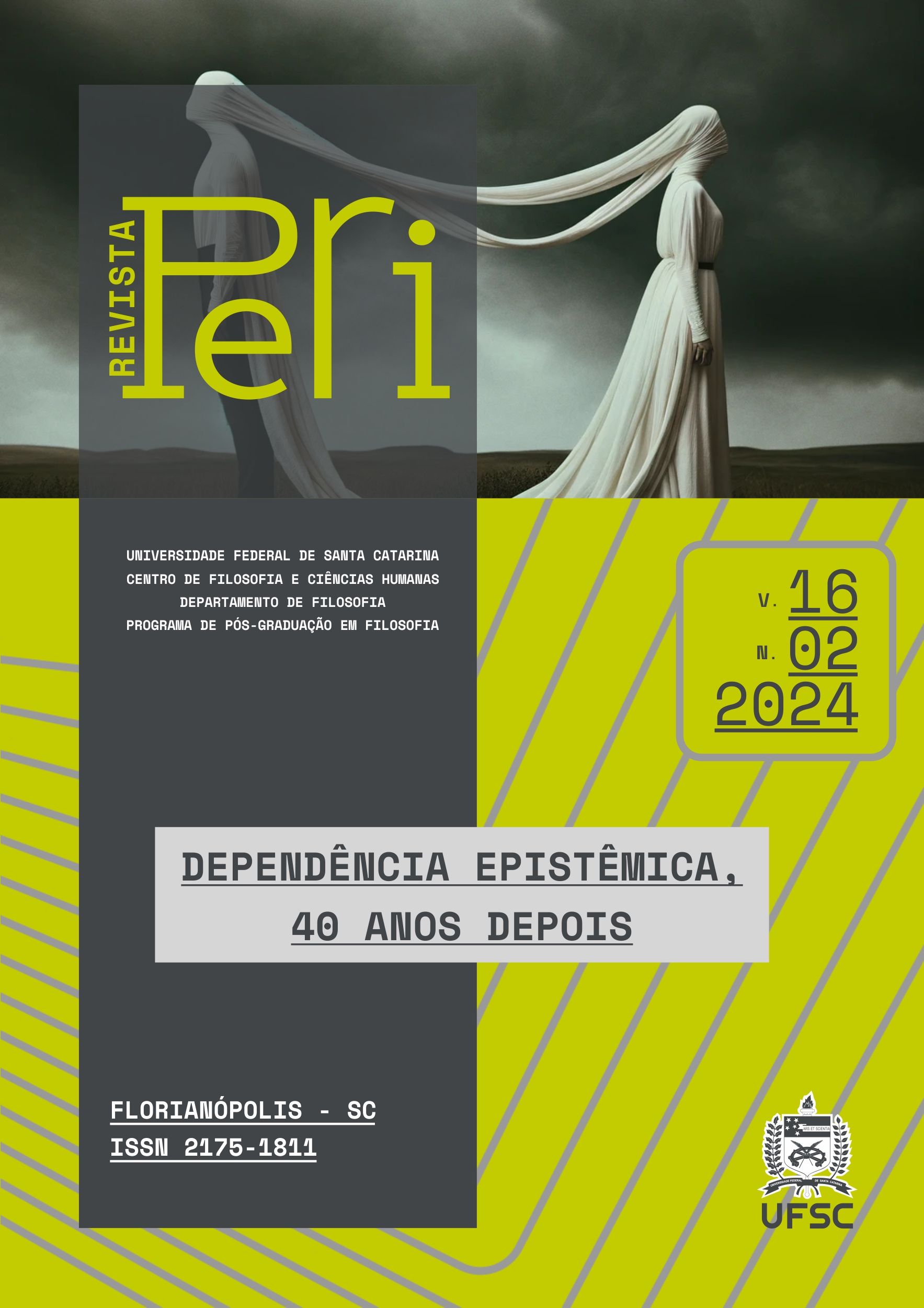Devemos educar para a autonomia?
A virtude da autonomia intelectual e o problema da dependência epistêmica
Palavras-chave:
autonomia intelectual, dependência epistêmica, epistemologia das virtudes, epistemologia social, educaçãoResumo
: O presente trabalho consiste em uma investigação sobre a autonomia intelectual do ponto de vista da epistemologia das virtudes. Tal investigação se dá a partir da problemática estabelecida no âmbito da epistemologia social: se somos epistemicamente dependentes, podemos ser epistemicamente autônomos? Abrem-se dois caminhos para responder esse problema: primeiro, revisitar o conceito de autonomia intelectual de modo a inserir, nessa virtude, elementos de dependência epistêmica; segundo, rejeitar ou diminuir o valor da autonomia intelectual. Esses caminhos são representados, respectivamente, pelas abordagens de Matheson (2022) e Battaly (2022). Após apresentarmos os argumentos e a estrutura proposta por ambos os autores, buscaremos avaliar qual opção pode ser mais viável, precisa ou útil considerando contextos educacionais. Argumentamos que o modelo Battaly é mais pertinente, pois permite análises pedagógicas mais precisas e certeiras, na medida que mantém uma percepção individualista da autonomia, mas adiciona valor a uma nova virtude, a da interdependência epistêmica.
Referências
BAEHR, Jason. The Inquiring Mind: On Intellectual Virtues & Virtue Epistemology. Nova York: Oxford University Press, 2011.
BATTALY, Heather. Intellectual Autonomy and Intellectual Interdependence. In: MATHESON, J.; LOUGHEED, K. (eds.). Epistemic autonomy. Nova York, Londres: Routledge, Taylor & Francis Group, 2022, pp. 153-172.
BRASIL. Ministério da Educação. Base Nacional Comum Curricular. Brasília, 2018.
BUGS, Jonathan D. V.; TOMAZETTI, Elisete M. Da obliteração aos vestígios de vida: uma análise das possibilidades para o ensino de filosofia nas áreas das ciências humanas e sociais aplicadas da BNCC/EM (2018). Kalagatos - Revista de Filosofia V. 18, N. 2, 2021, p. 173-202.
COADY, C. A. J. Testimony and intellectual autonomy. Studies in History and Philosophy of Science V. 33, N.2, 2002, p. 355-372.
ELGIN, Catherine. Epistemic agency. Theory and Research in Education V. 22, N. 2, 2013, p. 135-152.
GRASSWICK, Heidi. Epistemic autonomy in a social world of knowing. In: BATTALY, H. (ed.), The Routledge handbook of virtue epistemology. Nova York: Routledge, 2019, pp. 330-339.
HARDWIG, John. Epistemic dependence. The Journal of Philosophy V. 82, N. 7, jul. 1985, p. 335-349.
KAMII, Constance. Autonomy: The Aim of Education Envisioned by Piaget. The Phi Delta Kappan V. 65, N. 6, 1984, p. 410-415.
KAMII, Constance; HOUSMAN, Leslie. Young children reinvent arithmeti. Nova York. NY: Teachers College Press, 2000.
KING, Nathan L. The Excellent mind: intellectual virtues for everyday life. Nova York: Oxford University Press, 2021.
LACKEY, Jennifer. Preemption and the Problem of the Predatory Expert. Philosophical Topics V. 49, N. 2, outono 2021, p. 133-150.
LINDBERG, Christian. O ensino de Filosofia e a reforma educacional: o que fazer? Coluna ANPOF, 05 abr. 2019. Disponível em: <https://anpof.org.br/comunicacoes/coluna-anpof/o-ensino-de-filosofia-e-a-reforma-educacional-o-que-fazer>. Acesso em: 04 set. 2023.
MATHESON, Jonathan. The virtue of Epistemic Autonomy. In: MATHESON, J.; LOUGHEED, K. (eds.). Epistemic autonomy. Nova York, Londres: Routledge, Taylor & Francis Group, 2022, p. 173-194.
MCKENNA, Robin. Non-Ideal Epistemology. Oxford: Oxford University Press, 2023.
ORTIZ, Claudia María Álvarez. Does philosophy improve critical thinking skills? University of Melbourne, Department of Philosophy: Melbourne, 2007.
PIAGET, Jean. The moral judgment of the child. Nova York, NY: The Free Press, 1965 (Publicado originalmente em 1932).
ROBERTS, Robert C.; WOOD, W. Jay. Intellectual Virtues: An Essay in Regulative Epistemology. Nova York: Oxford University Press Inc., 2007.
SIEGEL, Harvey. Rationality and epistemic dependence. Educational Philosophy and Theory V. 20, N. 1, 1988, p. 1-6.
SOARES, Helton Lima; BRÍCIO, Vilma Nonato de. O ensino de filosofia sob o controle da concepção de competências na BNCC. REFilo V. 8, 2022, p. 1-19.
VELASCO, Patrícia Del Nero. Argumentação, Pensamento Crítico e Ensino de Filosofia: (im)precisões conceituais. In: CARVALHO, M.; ALMEIDA JR., B.; GONTIJO, P. Filosofia e ensinar filosofia. Coleção XVI Encontro ANPOF: ANPOF, 2015, p. 227-239.
Downloads
Publicado
Edição
Seção
Licença
Copyright (c) 2025 Marília Giammarco Polli

Este trabalho está licenciado sob uma licença Creative Commons Attribution-NonCommercial-ShareAlike 4.0 International License.
1. Autores mantém os direitos autorais e concedem à revista o direito de primeira publicação, com o trabalho simultaneamente licenciado sob a Creative Commons Attribution License que permite o compartilhamento do trabalho com reconhecimento da autoria do trabalho e publicação inicial nesta revista.
2. Autores têm autorização para assumir contratos adicionais separadamente, para distribuição não-exclusiva da versão do trabalho publicada nesta revista (ex.: publicar em repositório institucional ou como capítulo de livro), com reconhecimento de autoria e publicação inicial nesta revista.
3. Autores têm permissão e são estimulados a publicar e distribuir seu trabalho online (ex.: em repositórios institucionais ou na sua página pessoal) a qualquer ponto antes ou durante o processo editorial, já que isso pode gerar alterações produtivas, bem como aumentar o impacto e a citação do trabalho publicado (Veja O Efeito do Acesso Livre).


